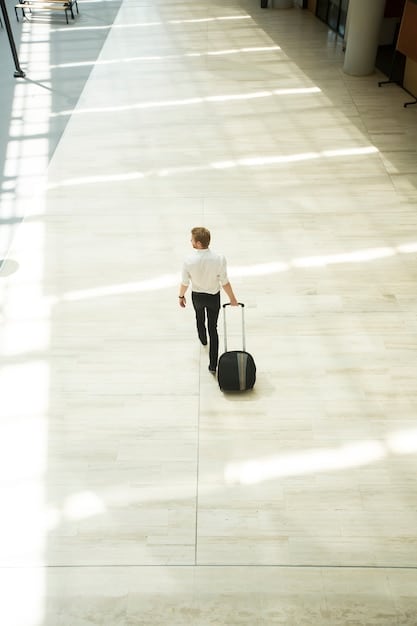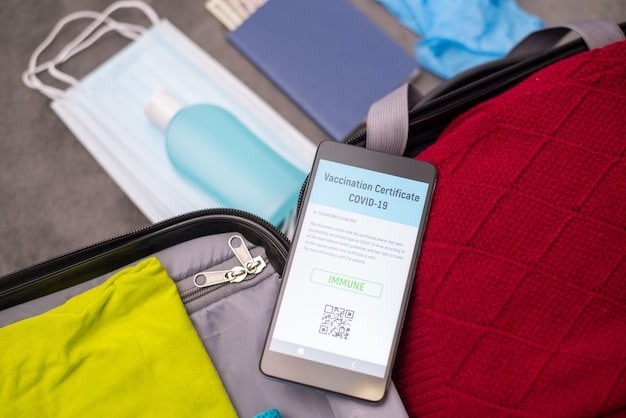Lost Luggage Survival Guide: What to Do in the First 24 Hours

Lost luggage can disrupt travel plans; this guide provides immediate steps, from reporting at the airport and tracking your bag online to filing claims and preparing for essential purchases, ensuring you navigate the first 24 hours effectively.
Discovering your luggage is missing after a flight can be incredibly stressful. This lost luggage survival guide: what to do within the first 24 hours aims to provide you with a clear, actionable plan to minimize the disruption and maximize the chances of a swift recovery of your belongings.
Report the Missing Luggage Immediately
The first and most crucial step when you realize your luggage is missing is to report it immediately. Time is of the essence, as the sooner you report, the quicker the airline can begin the search and recovery process.
File a Lost Luggage Report
Head to the airline’s baggage claim service desk. Be prepared to provide your flight information, baggage tag number, and a detailed description of your luggage. The more specific you are, the better. Include details like the color, brand, any distinguishing marks, and even a list of some of the items inside.
Receive a File Reference Number
Once you’ve filed the report, the airline representative will provide you with a file reference number. This number is essential for tracking the status of your lost luggage and for any future communication with the airline. Keep this number safe and easily accessible.
Filing the report is just the beginning. It’s important to understand your rights and to be proactive in tracking your luggage. Here’s what to do next:
- Keep all your travel documents, including your boarding pass and baggage claim tag.
- Ask the airline representative for contact information and clarification on the airline’s policy regarding lost luggage.
- Make a note of the date, time, and name of the person you spoke with at the service desk.
Reporting your luggage immediately not only starts the official search process but also establishes a documented record of your loss, which will be vital when filing claims for reimbursement.
Track Your Luggage Online
In today’s digital age, airlines often provide online tracking tools that allow you to monitor the progress of your lost luggage. Use these resources to stay informed and possibly speed up the recovery process.
Use the Airline’s Online Tracking System
Most airlines have a dedicated section on their website or app where you can enter your file reference number and track the status of your lost luggage. This system provides updates on where your luggage was last scanned and any actions being taken to locate it.
Consider Third-Party Tracking Services
If the airline’s tracking system is not providing enough information, explore third-party tracking services specifically designed for lost luggage. These services often aggregate data from multiple sources and can offer a more comprehensive view of your luggage’s journey.
Tracking your luggage online is a proactive way to stay informed and potentially identify any issues early on. Here are some tips for effective online tracking:
- Check the tracking status regularly, ideally once or twice a day.
- If you notice any unusual activity or lack of updates, contact the airline immediately.
- Keep screenshots of the tracking history as proof of the luggage’s whereabouts.
By leveraging online tracking tools, you can stay one step ahead and potentially assist the airline in locating your missing luggage more efficiently.

Understand Your Rights and the Airline’s Responsibilities
Knowing your rights as a passenger can significantly impact how the airline handles your lost luggage claim. Airlines have specific responsibilities when it comes to lost, delayed, or damaged baggage.
Review the Montreal Convention
The Montreal Convention is an international treaty that establishes airline liability for lost, delayed, or damaged baggage on international flights. It sets the maximum amount an airline is liable for, which is currently around $1,700 USD. Familiarize yourself with this convention to understand the limitations and protections available to you.
Know Your Rights for Domestic Flights
For domestic flights, airline liability is governed by federal regulations, specifically the U.S. Department of Transportation. The maximum liability is also around $3,800 USD, but it’s essential to check the airline’s specific terms and conditions, as they may have additional limitations or requirements.
Understanding your rights empowers you to negotiate effectively with the airline and ensures you receive fair compensation for your loss. Keep these points in mind:
- Airlines are responsible for reasonable, verifiable, and necessary expenses incurred due to the delay in receiving your luggage.
- You have the right to file a claim for compensation, but there are specific deadlines for doing so.
- Airlines may offer reimbursement for essential items like toiletries and clothing while your luggage is delayed.
Being well-informed about your rights will allow you to navigate the lost luggage claim process with confidence and ensure that the airline fulfills its responsibilities.
File a Claim for Compensation
After reporting the lost luggage and understanding your rights, the next step is to formally file a claim for compensation. This process involves documenting your losses and submitting the necessary paperwork to the airline.
Document Your Losses
Create a detailed inventory of the items that were in your lost luggage, including their value and any receipts you may have. The more documentation you can provide, the stronger your claim will be. Consider including photographs of the items and any proof of purchase.
Submit the Claim Form within the Deadline
Airlines have specific deadlines for submitting a lost luggage claim, typically within 21 days of the date the luggage was lost. Obtain the claim form from the airline’s website or customer service and fill it out accurately and completely. Include all supporting documents, such as your baggage claim tag, file reference number, and inventory of lost items.
Filing a claim requires attention to detail and a proactive approach. Here’s what to keep in mind:
- Be clear and concise in your claim, providing all necessary information without unnecessary details.
- Keep copies of all documents you submit to the airline for your records.
- Follow up with the airline regularly to check on the status of your claim.
By documenting your losses thoroughly and submitting the claim form within the deadline, you increase your chances of receiving fair compensation for your lost luggage.
Prepare for Essential Purchases
While waiting for your luggage to be recovered, it’s essential to prepare for any necessary purchases, especially if your luggage contains essential items like clothing, toiletries, or medication.
Inquire About Airline Reimbursement Policies
Check with the airline about their policies regarding reimbursement for essential purchases. Some airlines will provide a per diem allowance or reimburse you for reasonable expenses incurred due to the delay in receiving your luggage. Obtain the necessary forms and guidelines from the airline.
Prioritize Essential Items
Focus on purchasing only the most essential items you need to get by, such as toiletries, underwear, and a change of clothes. Keep receipts for all purchases, as you will need them to claim reimbursement from the airline.
Being prepared for essential purchases minimizes the inconvenience caused by the delayed luggage. Consider these tips:
- Ask the hotel if they can provide complimentary toiletries or a toothbrush.
- Look for affordable options at local stores or pharmacies rather than high-end retailers.
- If you have travel insurance, check if it covers essential purchases due to lost luggage.
By inquiring about airline reimbursement policies and prioritizing essential items, you can manage the immediate impact of lost luggage and minimize your expenses.

Stay Persistent and Patient
Dealing with lost luggage can be a frustrating and time-consuming process. It’s important to stay persistent and patient throughout the entire ordeal, as it may take time for the airline to locate and return your luggage.
Maintain Regular Communication with the Airline
Keep in regular contact with the airline’s customer service department to inquire about the status of your lost luggage. Be polite but assertive in your communication, and document each interaction, including the date, time, and name of the representative you spoke with.
Escalate the Issue if Necessary
If you are not receiving satisfactory assistance from the airline, don’t hesitate to escalate the issue to a supervisor or manager. You can also file a complaint with the U.S. Department of Transportation or the Better Business Bureau if you feel the airline is not handling your claim fairly.
Persistence and patience are key to resolving the lost luggage issue effectively. Remember these points:
- Stay organized and keep all your documents and communication records in one place.
- Be prepared to provide additional information or documentation if requested by the airline.
- Don’t give up, even if it takes time to resolve the issue.
By staying persistent and patient, you increase your chances of a successful outcome and ensure that the airline takes your claim seriously.
Consider Travel Insurance
Travel insurance can be a valuable tool for protecting yourself against various travel-related risks, including lost, delayed, or damaged luggage. Consider purchasing a travel insurance policy before your trip to provide an extra layer of protection.
Understand the Coverage
Review the terms and conditions of your travel insurance policy to understand the coverage for lost luggage. Check the policy limits, any exclusions, and the process for filing a claim. Some policies provide higher coverage limits and more comprehensive benefits than others.
Supplement Airline Coverage
Travel insurance can supplement the airline’s liability coverage for lost luggage, providing additional compensation for your losses. It can also cover expenses like essential purchases, trip interruption, and even the cost of replacing lost travel documents.
Travel insurance offers peace of mind and financial protection in case of lost luggage or other travel-related incidents. Remember these tips:
- Purchase travel insurance before your trip to ensure coverage.
- Keep a copy of your insurance policy with you while traveling.
- File a claim with the insurance company as soon as possible after the loss.
By considering travel insurance, you can protect yourself against the financial impact of lost luggage and enjoy your trip with greater peace of mind.
| Key Point | Brief Description |
|---|---|
| 📝 Report Immediately | File a report at the airline’s service desk as soon as you realize your luggage is missing. |
| 💻 Track Online | Use the airline’s tracking system and third-party services to monitor your luggage’s status. |
| ✅ Know Your Rights | Understand your rights under the Montreal Convention and domestic regulations. |
| 💰 File a Claim | Document your losses and submit a claim form within the airline’s deadline. |
FAQ
▼
Report the missing luggage to the airline’s baggage claim service desk immediately. Provide them with your flight details, baggage tag number, and a detailed description of your luggage.
▼
Use the airline’s online tracking system, which you can usually find on their website or mobile app. Enter the file reference number provided by the airline to check the status of your luggage.
▼
The Montreal Convention protects you, establishing airline liability for lost luggage. This treaty sets a maximum liability amount, which is approximately $1,700 USD.
▼
You can generally claim reimbursement for reasonable, verifiable, and necessary expenses incurred due to the delay. This often includes essential items like toiletries, clothing, and medication.
▼
Escalate the issue to a supervisor or manager within the airline. If the problem persists, you can file a complaint with the U.S. Department of Transportation or the Better Business Bureau.
Conclusion
Dealing with lost luggage can be challenging, but by taking swift action and understanding your rights, you can navigate the situation effectively. Remember to report the loss immediately, track your luggage online, and file a claim for compensation. Stay persistent and patient, and consider travel insurance for added protection. With these strategies, you can minimize the disruption and maximize your chances of a successful resolution.





